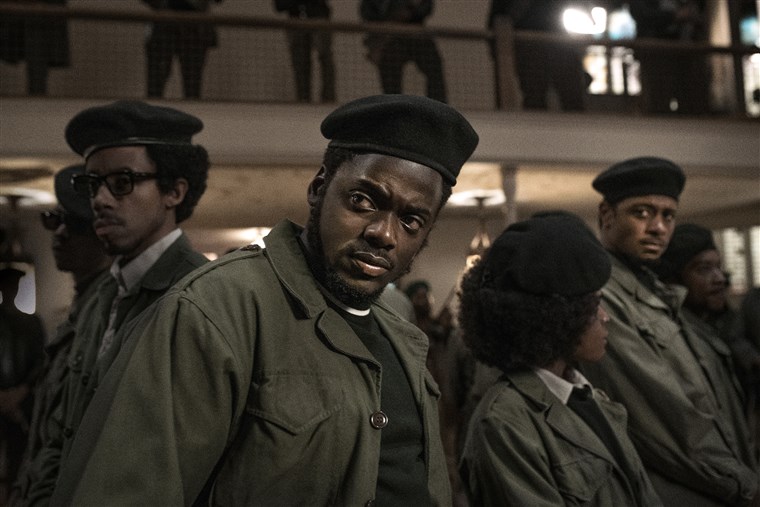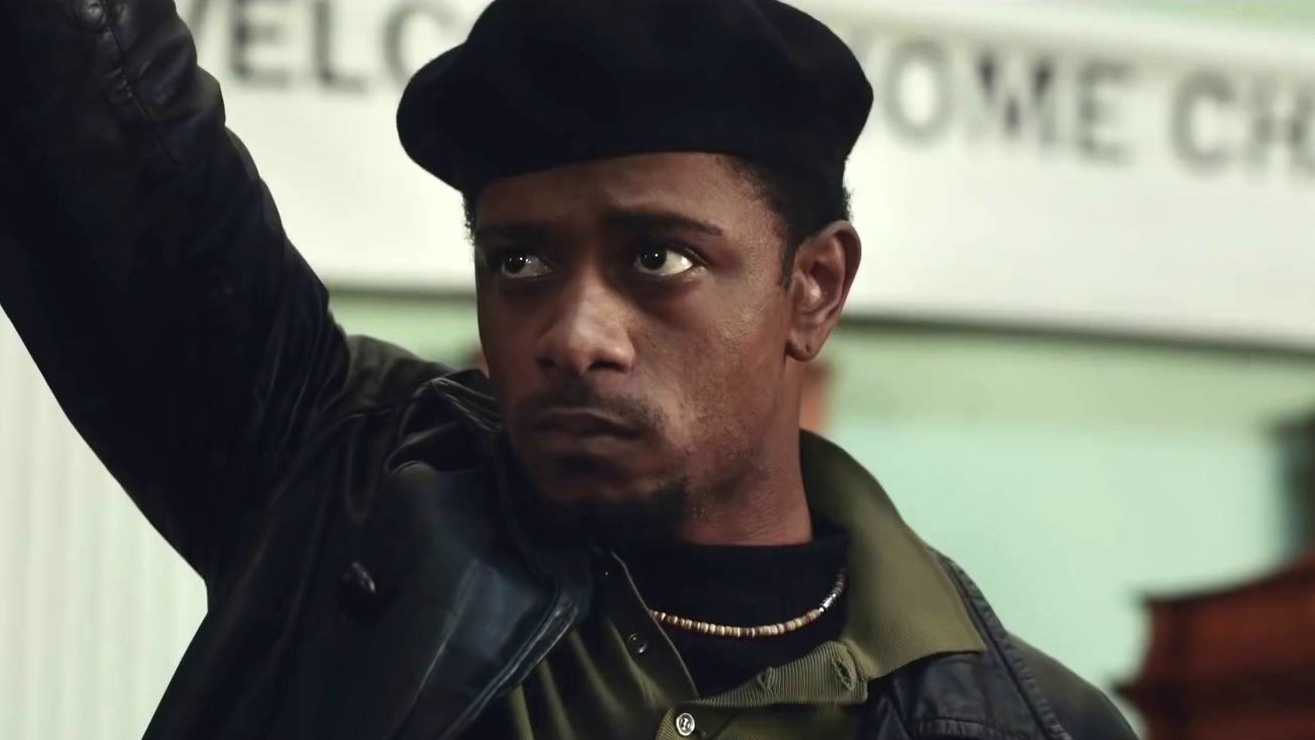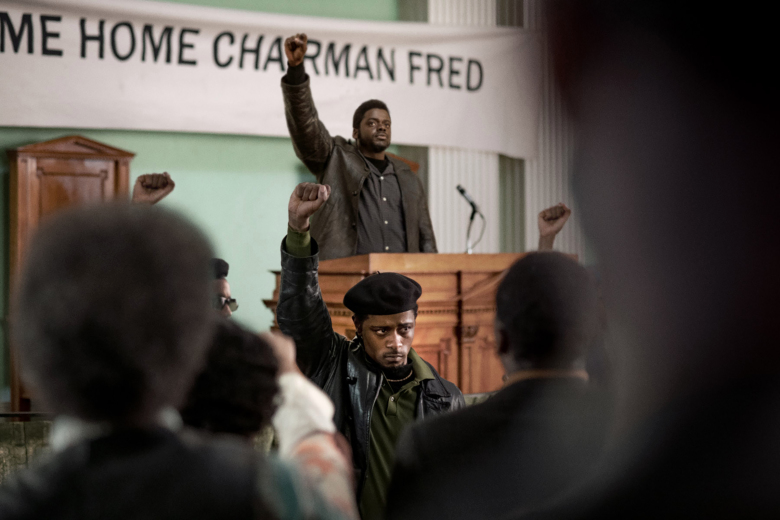Photo via Indie Wire.
Heavy Spoilers are in this article.
The movie begins at the tail end of the Civil Rights movement with the United States in a stage of unrest.
The audience is provided a montage of different clips showing the dissatisfaction of Black Americans with their treatment within the United States and how the Black Panther party became a political tool to voice their frustrations and enhance their political power in this country.
One of the strongest voices in the party is Fredrick Allen Hampton, a fiery activist who is the chairman of the Illinois chapter of the Black Panther Party, and deputy chairman of the national party.
In the movie, Hampton, who is brilliantly played by Daniel Kulayaa, has gained so much prominence that J. Edgar Hoover, the inaugural Director of the Federal Bureau of Investigation of the United States (FBI), has declared him a threat. Hoover, played by Martin Sheen, fears Hampton’s ability to unite the communist, anti-war and new left movements together and orders a group of FBI agents to prevent the rise of a Black Messiah. One of the agents he is talking to is Roy Moore, played by Jesse Plemons.
Moore takes on the mission of taking down the Black Panthers by recruiting juvenile William O’Neal. Lakiefh Stanfield provides an excellent portrayal of O’Neal, who must choose between 18 months in prison or become an informant for the FBI and infiltrate the Panthers; he chooses the latter, becoming Judas.
From then on the film explores a small, but pivotal time in American History and how these individuals were internal in a movement and changed the course of history.
“Judas and the Black Messiah” is a film that moves with precision and evokes powerful themes.
No scene is wasted and every character and scene serves a purpose and thematically the movie illustrates its points smoothly.
The reason behind it? Shaka King.
In only his second feature film, King has made one of the best biopics in recent memory. The director shows the thematic juxtaposition between characters, relationships and groups.
The theme of relationships thrives behind Hampton and O’Neal, two different men whose paths collide. More glimpses of this are shown behind O’Neal’s relationship with Moore and Hampton’s relationship with his wife and, of course, the differences between the Black Panther Party, Chicago Police and FBI.
Credit has to be given to the twin writers Kenny and Keith Lucas.

In an interview with Popsugar, both writers spoke about the importance of accurately depicting the Black Panthers:
“Their militancy and their rhetoric, it didn’t come in a vacuum,” said Keith. “Back then, the police were even more vicious than the Panthers, but that wasn’t a conversation that was happening in the ’60s, ’70s, ’80s, especially in movie form. So, this was an opportunity to not only show a more nuanced perspective of the Panthers, but to also show how crude the FBI was in the assassination of Fred Hampton.”
The Lucas brothers’ tremendous writing is enhanced by the amazing performances of the actors.
Lakief Stanfield provides a layered performance that almost makes you feel sympathetic for a tortured soul such as William O’Neal. We first see him as a 17-year-old petty criminal trying to hijack a car. He is then presented with the alternative of spending time in prison or going undercover for the FBI.
The movie does a great balancing act with the O’Neal’s character. We see him rise through the ranks within the party and become a valuable member. But for every moment of growth, we are treated to another moment of cowardice.
Given the constant back and forth of his character arc, we are treated to moments he seems to believe in not only the mission of the Black Panther’s but Hampton himself, which makes it heartbreaking when we see him make his choice at the end of the film.
O’Neal’s fears control him. And when presented with losing his freedom or betray the movement, he chooses himself.
In the movie, he claims that Roy Mitchell is someone he looked up to — the same man that forced him to become an informant or send him to prison. In one scene, he makes the false equivalency between the Black Panther Party and the KKK. The film tries to make him somewhat sympathetic as a man trying to do right, but fighting on the wrong side of history due to his ignorance.
But Kulayah’s portrayal of Fred Hampton is nothing short of amazing.
If “Get Out” was his breakout role — where he also starred with Stanfield — then this is the role that cements the English actor as a star.
From the moment Hampton speaks you are drawn into the rhythmic cadence of his voice, the purposeful use of his powerful words and the passion he uses to evoke them.
In the middle of the movie, he has a breathtaking speech at one point claiming repeatedly,
“I am a revolutionary!”
You witness not only the oratory genius, but also the inspiration and leadership of the 21-year-old activist.
We also see the political prodigy at work when the Black Panthers recruit and form relationships with different groups throughout the city to create a coalition to fight police corruption in Chicago.
At one point in the movie, the character O’Neal says, “Fred could sell salt to a slug.”
Hampton was respected by many. When presented with the choice of going back to prison or accepting party funds to escape the country, he refuses to take the money and says that it should be used to create a clinic. That selfless choice shows the difference between Hampton and O’Neal.
Hampton is a complete human being while O’Neal is unwilling to sacrifice.
When Hampton is not providing auditory masterpieces, his best moments are with his girlfriend Deborah Johnson who is played by actress Dominique Fishback. Johnson looks at Hampton with admiration and Hampton looks at her with a tenderness that reminds him what he is fighting for. Fishback unlocks the heart of Hampton.

When Hampton almost reaches the level of a Messianic figure, Johnson makes him human. The chemistry between Kulayaa and Fishback is strong; you believe that the characters are not only in love, but complement one another.
At the beginning of the movie, Hampton says,
“We don’t fight fire with fire, we fight it with water. We don’t fight racism with racism, we fight it with solidarity. We ain’t gonna fight capitalism with Black capitalism, we gonna fight with socialism.”
The film also shows the Black Panthers providing free breakfast to the children of Chicago. When the headquarters is burned down, the community pitches in and rebuilds it.
The message that seems to be behind it all is the Black Panther Party’s strength through solidarity, working for each other instead of a corporation, supporting the community.
Ultimately, it is a message of unity.
Hoover expresses to Mitchell in the film that their entire way of life is at stake due to a Black political group who demands equal treatment.
Throughout the film, we see the mistreatment of Black and poor people by police officers and the eventual government-sanctioned assignation of Hampton, destroying the movement — all to preserve white supremacy and suppress black life.
When thinking about the tragic murder of Hampton and the FBI’s hand in it, I wonder how does one reconcile with a government that has consistently used its power to kill Black people fighting for equality.
How can that ever be forgiven?
I think back to a quote by Maya Angelou who once said, “History, despite its wrenching pain, cannot be unlived, but if faced with courage, need not be lived again.”
I hope a film like this gives more Americans the courage to look at the immoral history of our justice system and fight for a better one in the future.



You have made some decent points there. I looked on the internet to learn more about the issue and found most people will go along
with your views on this web site.